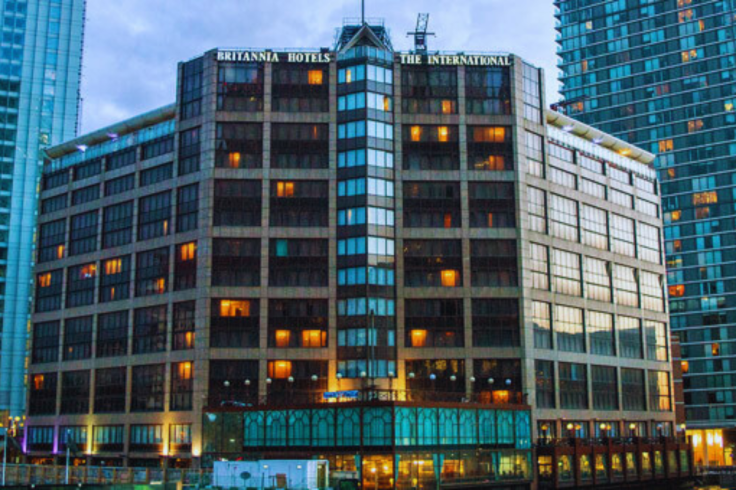Outrage as 4-Star Hotel in London to Welcome Hundreds of Asylum Seekers
Business leaders in Canary Wharf expressed concerns about the area's reputation, already struggling with office vacancy rates exceeding 30%.

Protesters clashed with the Metropolitan Police during demonstrations outside the Britannia International Hotel in Canary Wharf, where the UK government plans to house asylum seekers at the four-star establishment.
The clashes on 22 July marked the latest flashpoint in Britain's immigration debate, with demonstrators hurling eggs and projectiles from nearby buildings whilst waving St George's flags. Police deployed a helicopter for surveillance and established a security cordon around the 500-room hotel on Tuesday to prevent further escalation.
Home Office Minister Seema Malhotra claimed that the government has removed more than 35,000 individuals with no legal right to remain since July 2024. However, official data shows that actual returns totalled 24,103 between July 2024 and March 2025. The minister's statement comes amid mounting pressure over the £3 billion annual cost of housing 32,345 asylum seekers in hotels across the nation.
Protests and Public Backlash
The Metropolitan Police reported no arrests among the protesters, as its spokesperson confirmed that investigations into the egg-throwing incidents are underway, with CCTV footage under review.
Crowds had gathered outside the Britannia International Hotel after reports poured in about its conversion into temporary accommodation for asylum seekers.
Social media footage captured eggs splattering near pro-migrant demonstrators, with some projectiles launched from nearby skyscrapers.
Tower Hamlets Council confirmed the Home Office's plan to use the hotel's 500 rooms, but the Home Office clarified on 23 July 2025 that no asylum seekers are currently housed there, denying claims of transfers from Epping.
Following news that the Britannia Hotel in Canary Wharf is now housing illegal immigrants, a group of protesters has gathered outside. There's a significant police presence here, but that's hardly surprising given what happened in Epping last Thursday night. pic.twitter.com/X5ZFzlKlC1
— Matt Capon (@MattLCapon) July 22, 2025
X posts reflect the polarised sentiment. @annief1 posted on 23 July 2025, 'Absolutely DISGRACEFUL BEHAVIOUR BY THE GOVERNMENT. ITS OUTRAGEOUS.'
Meanwhile, @sisterhaze noted, 'Workers haul beds into posh 4-star London hotel set to house hundreds of asylum seekers – as protesters gather outside.'
Workers haul beds into posh 4-star London hotel set to house hundreds of asylum seekers – as protesters gather outsidehttps://t.co/ugzsy7QccR
— Hay (@sisterhaze) July 23, 2025
The unrest follows a pattern of demonstrations, with 1,000 protesters in Epping chanting 'send them home' after an asylum seeker's arrest for alleged sexual offences.
Hotel's Transformation and Economic Impact
The Britannia International Hotel, a £130 ($176) a-night venue with sweeping views over the London skyline, is undergoing rapid changes.
On 23 July 2025, workers were seen unloading mattresses and orange juice pallets, flanked by private security and metal fencing. The move has disrupted guests, with cancellations reported due to a private hire event.
One guest posted online, 'My confirmed reservation was cancelled less than 24 hours before my stay... no support or alternative accommodation offered' as reported by Daily Mail.
The decision to house asylum seekers in hotels costs taxpayers an estimated £3 billion ($4.02 billion) annually, with 32,345 asylum seekers currently in such accommodations across the UK.
Critics argue that this strains public resources, while supporters, such as Dr Kambiz Boomla, a retired GP, counter, 'If refugees' claims were processed quickly, they could work and contribute to society.'
The hotel's conversion has also raised concerns about Canary Wharf's economic decline, with campaigners claiming it's becoming a dumping ground for migrants amid falling demand for high-end offices.
Business leaders in Canary Wharf have expressed concerns about the area's reputation, which is already struggling with office vacancy rates exceeding 30%. The financial district's transformation into temporary asylum accommodation has prompted warnings about economic decline in London's former banking heartland.
Political and Social Ramifications
The protests highlight broader tensions over immigration policy. Shadow Justice Secretary Robert Jenrick called the situation a national security emergency, urging immediate deportations.
Tower Hamlets Council is collaborating with the Home Office to ensure the safety and safeguarding of residents. Still, local Tory councillor Peter Golds claimed the council was informed only on 22 July, according to Express.
The unrest risks escalating into a second summer of riots, as critics of Labour's immigration policies have warned. Anti-migrant protests have spread beyond London, with similar demonstrations also taking place in Norfolk and Rotherham.
Home Office Minister defended the government's approach, stating, 'We are deporting those with no right to be in the UK – over 35,000 since last July,' she said.
Current asylum trends indicate that Asia has become the most common origin region, with Pakistani nationals leading the applications, followed by Afghans. This marks a shift from previous years, when the Middle East dominated, primarily with Syrian and Iranian nationals. In 2024, the UK received 84,200 asylum applications relating to 108,100 individuals—the highest annual number ever recorded.
Government data also revealed that Albanian nationals comprised the largest share of returns, accounting for 40% of all asylum-related removals in 2024. This follows a UK-Albania agreement that strengthened cooperation on identifying and returning Albanian foreign national offenders, who represent between 24% and 37% of criminal deportations annually.
The controversy underscores Britain's struggle to balance humanitarian obligations with public sentiment, as hotels from Manchester to Dover house asylum seekers awaiting case determinations. With processing backlogs exceeding 175,000 applications and the total asylum caseload reaching 224,700 cases by June 2024, the temporary accommodation crisis shows no immediate signs of resolution.
© Copyright IBTimes 2025. All rights reserved.




















